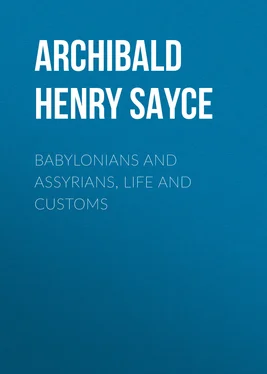Archibald Henry Sayce - Babylonians and Assyrians, Life and Customs
Здесь есть возможность читать онлайн «Archibald Henry Sayce - Babylonians and Assyrians, Life and Customs» — ознакомительный отрывок электронной книги совершенно бесплатно, а после прочтения отрывка купить полную версию. В некоторых случаях можно слушать аудио, скачать через торрент в формате fb2 и присутствует краткое содержание. Жанр: foreign_prose, История, foreign_edu, foreign_antique, на английском языке. Описание произведения, (предисловие) а так же отзывы посетителей доступны на портале библиотеки ЛибКат.
- Название:Babylonians and Assyrians, Life and Customs
- Автор:
- Жанр:
- Год:неизвестен
- ISBN:нет данных
- Рейтинг книги:5 / 5. Голосов: 1
-
Избранное:Добавить в избранное
- Отзывы:
-
Ваша оценка:
- 100
- 1
- 2
- 3
- 4
- 5
Babylonians and Assyrians, Life and Customs: краткое содержание, описание и аннотация
Предлагаем к чтению аннотацию, описание, краткое содержание или предисловие (зависит от того, что написал сам автор книги «Babylonians and Assyrians, Life and Customs»). Если вы не нашли необходимую информацию о книге — напишите в комментариях, мы постараемся отыскать её.
Babylonians and Assyrians, Life and Customs — читать онлайн ознакомительный отрывок
Ниже представлен текст книги, разбитый по страницам. Система сохранения места последней прочитанной страницы, позволяет с удобством читать онлайн бесплатно книгу «Babylonians and Assyrians, Life and Customs», без необходимости каждый раз заново искать на чём Вы остановились. Поставьте закладку, и сможете в любой момент перейти на страницу, на которой закончили чтение.
Интервал:
Закладка:
At times the son-in-law found it difficult to get the dowry paid. From a deed dated in the third year of Cambyses we gather that the dowry, instead of being delivered “into the hand” of the bridegroom, as ought to have been done at the time of the marriage, was still unpaid nine years later. Sometimes, of course, this was due to the inability of the father-in-law to discharge his debt, through bankruptcy, death, or other causes. Where, therefore, the money was not immediately forthcoming, security was taken for its future payment. If payment in full was impossible, owing to pecuniary losses incurred after the marriage contract had been drawn up, the bridegroom was entitled to claim a proportionate amount of it on behalf of his wife. The heirs were called upon to pay what was due if the father-in-law died between the drawing-up of the contract and the actual marriage, and when the wife died without children it returned to her “father's house.”
If the husband died and his widow married again, she carried her former dowry with her. In such a case the children of the first marriage inherited two-thirds of it upon her death, the remaining third going to the children of the second husband. This was in accordance with a law which regulated the succession to the property of a father who had married a second time, the children of the first marriage receiving two-thirds of it and the remainder being reserved for the children of the second wife. The law could only be overruled by a will made during the man's lifetime, and properly attested by witnesses.
The dowry could not be alienated by the wife without the consent of her parents, if they were still alive. In the year of Nergal-sharezer's accession, for example, a certain Nergal-ballidh and his wife Dhibtâ wished to sell a slave, who had constituted the dowry of Dhibtâ, for twenty-five shekels, but the sale was not considered valid until the consent of both her father and mother had been obtained.
The dowry was not the only property the woman was able to hold. She had similar power to hold and dispose of whatever else had come to her by inheritance or gift. The gains she made in business, the proceeds of the sale of her estates, and the interest upon the capital she lent, all belonged to herself, and to herself alone. For purposes of succession they were reckoned along with the dowry as constituting her property during life. In the thirty-fourth year of Nebuchadnezzar, for instance, a father stipulates that the creditors of his daughter's father-in-law should have no claim either upon her dowry or upon any other part of her possessions.
The power of the married woman over her property was doubtless the result of the system which provided her with a dowry. The principle of her absolute control over the latter once admitted, it was extended by the law to the rest of her estate. She thus took rank by the side of the man, and, like him, could trade or otherwise deal with her property as she chose. The dowry, in fact, must have been her original charter of freedom.
But it was so because it was given by her father, and not by the bridegroom. Where it was the gift of the bridegroom it was but a civilized form of purchasing the bride. In such a case the husband had a right to the person and possessions of the wife, inasmuch as he had bought her; as much right, in fact, as he had to the person and possessions of a slave. The wife was merely a superior slave.
Where, however, the dowry was the gift of the bride's father the conditions were reversed. The husband received not only a wife, he received also an estate along with her. He it was upon whom the benefit was conferred, and he had to accept the conditions offered him, not to make them. In a commercial state like Babylonia, property represented personalty, and the personalty of the wife accordingly remained with the family from which her property was derived, rather than with the husband, to whom the use of it was lent. Hence the independence of the married woman in Babylonia and her complete freedom of action as regards her husband. The property she possessed, the personalty it represented, belonged to herself alone.
Traces, however, may be detected of an older order of things, which once existed, at all events, in the Semitic element of the Babylonian population. The dowry had to be paid to the husband, to be deposited, as it were, in his “hand.” It was with him that the marriage contract was made. This must surely go back to an age when the marriage portion was really given to the bridegroom, and he had the same right over it as was enjoyed until recently by the husband in England. Moreover, the right of divorce retained by the husband, like the fact that the bride was given away by a male relation, points in the same direction. According to an early Sumerian law, while the repudiation of the wife on the part of the husband was punishable only with a small fine, for the repudiation of the husband by the wife the penalty was death. A deed drawn up in the time of Khammurabi shows that this law was still in force in the age of Abraham. It lays down that if the wife is unfaithful to her husband she may be drowned, while the husband can rid himself of his wife by the payment only of a maneh of silver. Indeed, as late as the time of Nebuchadnezzar, the old law remained unrepealed, and we find a certain Nebo-akhi-iddin, who married a singing-woman, stipulating in the marriage contract that if he should divorce her and marry another he was to pay her six manehs, but if, on the contrary, she committed adultery, she should be put to death with “an iron sword.”
In this instance, however, the husband married beneath him, and in view of the antecedents of the wife the penalty with which she was threatened in case of unfaithfulness was perhaps necessary. She came to him, moreover, without either a dowry or family relations who could give her away. She was thus little better than the concubines whom the Babylonian was allowed to keep by the side of his lawful wife. But even so, the marriage contract had to be made out in full legal form, and the penalty to be paid for her divorce was as much as £54. With this she could have lived comfortably and probably have had no difficulty in finding another husband.
The concubine was usually a slave who had been bought by the bridegroom. Occasionally, by agreement with the parents, the wife herself was in much the same position. Thus Dagil-ili, who married the daughter of a lady named Khammâ, gave the mother one and a half manehs of silver and a slave worth half a maneh, and agreed that if he married another wife he would give her daughter a maneh and send her back to her old home. Here the husband practically buys his wife, though even so the law obliged him to divorce her if he married again, and also fined him for doing so. Khammâ was apparently in financial difficulties, and consequently, instead of furnishing her daughter with a dowry, received money from the bridegroom. It was a private arrangement, and utterly opposed to the usual custom. The parents had, however, the power of selling their children before they came of age, and where the parents were dead, the same power was possessed—at any rate in Assyria—by a brother in the case of a sister. Doubtless the power was restricted by law, but the instances in which we hear of its being exercised are so rare that we do not know what these restrictions were.
Nor do we know the reasons which were considered sufficient to justify divorce. The language of the early laws would seem to imply that originally it was quite enough to pronounce the words: “Thou art not my wife,” “Thou art not my husband.” But the loss of the wife's dowry and the penalties attached to divorce must have tended to check it on the part of the husband, except in exceptional circumstances. Perhaps want of children was held to be a sufficient pretext for it; certainly adultery must have been so. Another cause of divorce was a legal one: a second marriage invalidated the first, if the first wife was still alive.
Читать дальшеИнтервал:
Закладка:
Похожие книги на «Babylonians and Assyrians, Life and Customs»
Представляем Вашему вниманию похожие книги на «Babylonians and Assyrians, Life and Customs» списком для выбора. Мы отобрали схожую по названию и смыслу литературу в надежде предоставить читателям больше вариантов отыскать новые, интересные, ещё непрочитанные произведения.
Обсуждение, отзывы о книге «Babylonians and Assyrians, Life and Customs» и просто собственные мнения читателей. Оставьте ваши комментарии, напишите, что Вы думаете о произведении, его смысле или главных героях. Укажите что конкретно понравилось, а что нет, и почему Вы так считаете.












